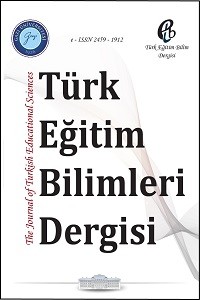Türkçe Öğrenen Yabancı Öğrencilerin Okuma Sürecinde Bilinmeyen Sözcüklerle Karşılaşınca Başvurdukları Çıkarım Stratejilerine İlişkin Görünümler
Öz
Okuma becerisi birçok karmaşık bilişsel işlemin yapılmasını gerektiren bir süreçtir. Bu süreçte okurlar metindeki sözcükleri tanımak zorundadır. Bir sözcüğü okuma sürecinde tanımak o sözcüğü metin içerisinde anlamlandırmayı gerektirir. Bu nedenle bir okur okumakta olduğu metinde geçen sözcükleri bilmelidir. Ancak bir okurun sözvarlığı yeterince geniş olsa da karşılaştığı her metindeki tüm sözcüklerin anlamını bilmesi mümkün değildir. Bir okur metindeki her sözcüğün anlamını bilmese de ipuçlarından yararlanarak sözcüğün anlamına ulaşmaya çalışır. Bunun için de çok farklı sözcüksel çıkarım stratejilerine başvurabilir. Bu çalışmanın amacı da Türkçe öğrenen yabancı öğrencilerin hangi sözcüksel çıkarım stratejilerine başvurduklarını belirlemektir. Betimsel nitelikli bu araştırmada tarama yöntemi kullanılmıştır. Araştırmanın çalışma grubunda bir devlet üniversitesinin Türkçe Öğretim Merkezi’nde öğrenimlerini sürdüren C1 düzeyinde 43 öğrenci yer almıştır. Türkçe öğrenen yabancı öğrencilerin okuma sürecinde bilinmeyen sözcüklerle karşılaşınca başvurdukları çıkarım stratejilerine ilişkin verileri toplamak 14 maddelik 4’lü likert tipi bir sormaca kullanılmıştır. Elde edilen veriler SPSS istatistik programına aktarılarak sıklık, yüzdelikler ve aritmetik ortalamaları belirlenmiştir. Araştırmanın sonucuna göre öğrenciler en çok bağlamdan yararlanarak sözcüğün anlamına ulaşmaya çalışmaktadır.
Anahtar Kelimeler
Kaynakça
- Bowyer-Crane, C. & Snowling, M. J. (2005). Assessing children’s inference generation: What do tests of reading comprehension measure?. British Journal of Educational Psychology ,75, 189–201.
- De Bot, K. Paribakht, S. & Wesche, M. (1997). Towards a lexical processing model for the study of second language vocabulary acquisition: Evidence from ESL reading . Studies in Second Language Acquisition, 19 (2), 309-329.
- Gu, Y. (2002). Gender, Academic Major, and Vocabulary Learning Strategies of Chinese EFL Learners. RLEC Journal, 33 (1), 35-54.
- Gu, Y. & Johnson, R. K. (1996). “Vocabulary learning strategies and language learning outcomes”. Language Learning, 46, 643–697.
- Haastrup, K. (1991). Lexical inferencing procedures or talking about words. Tubingen: Gunter Narr.
- Hamzah, M. S. G., Kafipour, R. & Abdullah, S. K. (2009). Vocabulary Learning Strategies of Iranian Undergraduate EFL Students and its Relation to their Vocabulary Size. European Journal of Social Sciences, 11 (1),
- Hu, M. & Nation, I. S. P. (2000). Vocabulary density and reading comprehension. Reading in a Foreign Language , 23, 403–430.
- Hu, H. M. & Nassaji, H. (2014). Lexical inferencing strategies: The case of succesful versus less succesful inferencers. System, 45, 27-38.
- İstifçi, İ. (2009). Lexical inferencing strategies of Turkish EFL learners. Journal of Language and Linguistic Studies, 5(1), 97-109.
- Kaivanpanah, S. & Rahimi, N. (2017). The effect of contextual clues and topic familiarity on L2 lexical inferencing and retention. Porta linguarum, 27, 4761.
- Laufer, B. (1989). What percentage of text-lexis is essential for comprehension? In C. Lauren & M. Nordman (Eds.), Special language: From humans to thinking machines (pp. 316–323). Clevedon, England: Multilingual Matters.
- Laufer, B. (1997). The lexical plight in second language reading: Words you don’t know, words you think you know and words you can’t guess. Second Language vocabulary acquisition: A rationale for pedagogy, 1, 20-34.
- Lawson, M. J. & Hobgen, D. (1996). The Vocabulary‐Learning Strategies of Foreign‐Language Students, Language learning, 46 (1), 101-135.
- Mokhtar, A. Z., Rawian, R. M., Yahaya, M. F., Abdullah, A. & Mohamed, A. R. (2009). Vocabulary Learnıng Strategıes of Adult Esl Learners. The English Teacher, 37, 133 – 145.
- Nassaji, H. (2006). The relationship between depth of vocabulary knowledge and L2 learners’ lexical inferencing strategy use and success. The Modern Language Journal, 90(3), 387-401.
- Nation, I. S. P. (2001). Learning Vocabulary in Another Language. Cambridge: Cambridge University Press.
- Read, J. (2000). Assessing vocabulary. UK: Cambridge University Press.
- Schmitt, N., Jiang, X. & Grabe, W. (2011). The percentage of words known in a text and reading comprehension. The Modern Language Journal, 95, 26-42.
- Shen, M-Y. (2018). Individual differences in strategy us for L2 lexical inferencing: The case of learning styles. Educational and Linguistic Research, 4 (1), 1-15.
- Qian, D. D. (2004). Second language lexical inferencing: Preferences, perceptions, and practices, In Paul Bogaards & Batia Laufer (Eds.) Vocabulary in a Second Language: Selection, acquisition, and testing, Amsterdam: John Benjamins Publishing Company.
- Ülper, H. & Kiraz, E. (2018). Metni Kavramada Belirleyici Olan Bilinmeyen Sözcük Oranı Eşikleri: Ortaokul Öğrencileri Açısından Bir Durum Belirleme Çalışması. UTEOK 2017’de Sunulan Bildiri, Ankara Üniversitesi, Ankara.
Ayrıntılar
| Birincil Dil | Türkçe |
|---|---|
| Bölüm | Makaleler |
| Yazarlar | |
| Yayımlanma Tarihi | 26 Haziran 2020 |
| Gönderilme Tarihi | 10 Aralık 2019 |
| Kabul Tarihi | 19 Mayıs 2020 |
| Yayımlandığı Sayı | Yıl 2020 Cilt: 18 Sayı: 1 |


